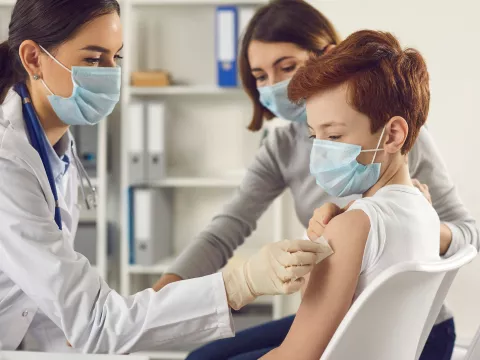- AdventHealth

Choose the health content that’s right for you, and get it delivered right in your inbox.
Last summer looked very different for most families. This year, many parents have been hoping for the return of summer camps, team sports and maybe even family getaways, and with the Pfizer COVID-19 vaccine receiving Emergency Use Authorization (EUA) from the FDA for ages 12 and older, that could be a very real possibility. Now many children have the opportunity to protect themselves and others against coronavirus and get back to some of their previous activities soon.
Of course, any decision relating to your child’s health and well-being will come with some questions. Here are answers to the more commonly asked coronavirus vaccine questions.
- Q: Is the COVID-19 vaccine safe for my child?
-
A: Yes. Extensive clinical trials were conducted with thousands of participants, including those 12 and older, to evaluate the COVID-19 vaccine and generate scientific data and other information for the Food and Drug Administration (FDA) to determine its safety and effectiveness. Your child cannot get COVID-19 from a vaccine.
- Q: Why should my child get the COVID-19 vaccine?
-
The Centers for Disease Control and Prevention ( CDC ) says the vaccination can help protect your child from getting COVID-19 in addition to helping prevent them from spreading the illness to others.
- Q: How does the COVID-19 vaccine work?
-
A: The vaccine helps your child develop antibodies that make them less susceptible to the disease. It does not use the live virus that causes COVID-19.
- Q: Which COVID-19 vaccine(s) can my child receive?
-
A: Anyone 12 years of age or older can receive the Pfizer vaccine, and anyone 18 years of age and older can receive the Moderna or Johnson & Johnson vaccine.
- Q: How is the Pfizer vaccine made?
-
A: The Pfizer and Moderna COVID-19 vaccines are made using mRNA. The Pfizer vaccine is also made with potassium chloride, sodium chloride and other ingredients .
- Q: What is mRNA? Can it be harmful to my child?
-
A: Messenger ribonucleic acid, or mRNA, is a molecule that is not harmful. While vaccines for some other illnesses — such as the varicella (chickenpox) vaccine — use bits of the virus in the vaccine to create what’s called a “live virus vaccine,” the COVID-19 vaccines being produced do not contain a live virus.
Instead, the Pfizer vaccine works by using synthetic mRNA to direct the body to produce a small amount of the spike protein. Once the vaccinated person’s immune system detects this protein, their body begins producing protective antibodies to defend against coronavirus. - Q: Will my child have side effects from the vaccine?
-
A: It’s possible. About half of all people who receive the vaccine experience some side effects, but that’s actually a result of the immune response brought on by the vaccine — meaning, it is working.
- Q: What are the most common side effects?
-
A: The most common side effect reported from those who have received the vaccine is an injection-site reaction. The Pfizer vaccine is administered in two doses, three weeks apart, and many of the side effects reported were after people got the second dose.
Other common side effects include:- Fatigue
- Fever
- Headache
- Muscle pain
- Q: Will the COVID-19 vaccine impact my child’s fertility in the future?
-
A: No. Medical experts say there is no link between the vaccine and fertility in those who may wish to become pregnant in the future. The American Society for Reproductive Medicine also supports vaccinations for pregnant women and those who may become pregnant in the future.
- Q: Where/when can my child get a COVID-19 vaccine?
-
A: Many area county health departments are offering vaccines to those ages 12 and older. Those who wish to be notified when AdventHealth will be having a community vaccine event can visit CoronavirusVaccineAlerts.com . At this time, AdventHealth pediatricians and family medicine providers are not administering the vaccine.
- Q: My child is younger than 12. When can they get vaccinated?
-
A: Right now, some pharmaceutical companies are in clinical trials for younger children and babies as young as 6 months. While we don’t know an exact timeframe as to when the COVID-19 vaccine will be available for those younger than 12, it is something that our communities are working towards.
Your Source for Trusted Coronavirus Vaccine Updates
With something as important as the coronavirus vaccine, you need to hear from a medical team who has your whole health in mind. For more coronavirus vaccine information from our medical experts, visit our Coronavirus Vaccine Resource Hub.



